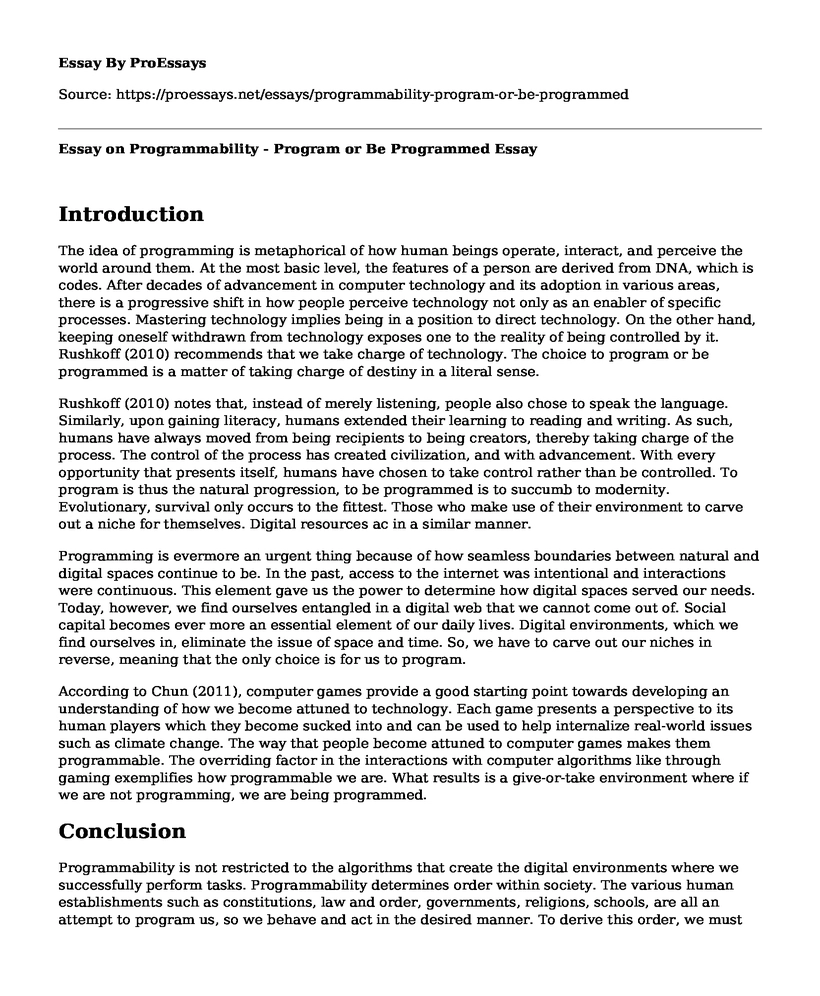Introduction
The idea of programming is metaphorical of how human beings operate, interact, and perceive the world around them. At the most basic level, the features of a person are derived from DNA, which is codes. After decades of advancement in computer technology and its adoption in various areas, there is a progressive shift in how people perceive technology not only as an enabler of specific processes. Mastering technology implies being in a position to direct technology. On the other hand, keeping oneself withdrawn from technology exposes one to the reality of being controlled by it. Rushkoff (2010) recommends that we take charge of technology. The choice to program or be programmed is a matter of taking charge of destiny in a literal sense.Rushkoff (2010) notes that, instead of merely listening, people also chose to speak the language. Similarly, upon gaining literacy, humans extended their learning to reading and writing. As such, humans have always moved from being recipients to being creators, thereby taking charge of the process. The control of the process has created civilization, and with advancement. With every opportunity that presents itself, humans have chosen to take control rather than be controlled. To program is thus the natural progression, to be programmed is to succumb to modernity. Evolutionary, survival only occurs to the fittest. Those who make use of their environment to carve out a niche for themselves. Digital resources ac in a similar manner.
Programming is evermore an urgent thing because of how seamless boundaries between natural and digital spaces continue to be. In the past, access to the internet was intentional and interactions were continuous. This element gave us the power to determine how digital spaces served our needs. Today, however, we find ourselves entangled in a digital web that we cannot come out of. Social capital becomes ever more an essential element of our daily lives. Digital environments, which we find ourselves in, eliminate the issue of space and time. So, we have to carve out our niches in reverse, meaning that the only choice is for us to program.
According to Chun (2011), computer games provide a good starting point towards developing an understanding of how we become attuned to technology. Each game presents a perspective to its human players which they become sucked into and can be used to help internalize real-world issues such as climate change. The way that people become attuned to computer games makes them programmable. The overriding factor in the interactions with computer algorithms like through gaming exemplifies how programmable we are. What results is a give-or-take environment where if we are not programming, we are being programmed.
Conclusion
Programmability is not restricted to the algorithms that create the digital environments where we successfully perform tasks. Programmability determines order within society. The various human establishments such as constitutions, law and order, governments, religions, schools, are all an attempt to program us, so we behave and act in the desired manner. To derive this order, we must take charge, of the program. In any case, programs on their own are merely the hardware over which the human resource is to participate in achieving the desired goals actively. The common denominator in all these frameworks that seek to attain order and ease of interaction is that they originate from human designing and execution. This design is not meant to stop but to be a continuous process of betterment.
References
Chun, W.H.K., 2011. Programmed Visions: Software and memory. MIT Press.
Rushkoff, D., 2010. Program or be programmed: ten commands for a digital age. Or Books.
Cite this page
Essay on Programmability - Program or Be Programmed. (2022, Mar 07). Retrieved from https://proessays.net/essays/programmability-program-or-be-programmed
If you are the original author of this essay and no longer wish to have it published on the ProEssays website, please click below to request its removal:
- What Are Three Examples of Web Marketing?
- Essay Sample on Business Outline
- Cybersecurity: Protecting Networks, Systems & Data From Digital Attacks - Essay Sample
- Essay Example on Healthcare: Usability Challenges for Data Exchange & Integration
- Google: The Behemoth of Search Since 1998 - Essay Sample
- The Internet: Revolutionizing Lives, But Not Without Risk - Essay Sample
- Article Review Sample on Google Making Us Ignorant? - Is Our Internet Use Affecting Us?







